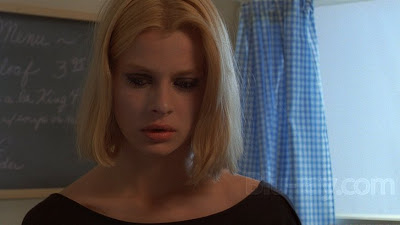Who in your life listens to you? Deeply. Who? And how?
Today I find that I am an incessant failure when it comes to listening. I want so badly to blurt in my own commentary, my own touch, into every crevice of a story I am presented with. Not every question should be answered with words.
When I came back to my friends and family after nearly a year away, I expected my loved ones to listen to my new stories, my new adventures. It didn't happen like I expected. Mostly, people want to share stories; to be inserted somehow into all events spoken. Relevance is paramount. I guess that makes sense... I do the same.
I wonder if that is how my grandmother feels. She, of such memory, surely has stories to tell; stories that require listening. But somewhere in the plodding of daily life (those are such different things: 'life' and 'daily life'), in the very yearning to be heard, her stories are compromised. She tells anecdotes, complaints... things that can be relevant to the mouths waiting to interject. So it goes.
Paris, Texas (Wim Wenders 1984) is a film that, for the vast majority of its time spent, moves along at a consistent pace. We meet a man somewhere in the desert. We are told he has been wandering in the desert for four years (not quite forty, but long enough to feel the effects of a promised land lost). At first, our wanderer is seen to be a mute; a mute void of memory. But time plods on. We meet the wanderer's brother. We learn the mute has a name, Travis, and more than that, a son. A beautiful, intelligent, curious seven-year-old boy.
Though he never says it, we learn what Travis wants. He wants the life he was once promised. So long ago. Perhaps unfortunately, he is wiser now, and his wisdom will reign in his fantasies. He has long since reached the end of his imagination. But he still wants. He still yearns.
Travis reaches his destination in the film's time, and everything stops. This man who was introduced to us as a mute, now must be heard. He finds his lost love, I gorgeous beauty who works in some sort of underground sex show. Her job is to play house, she on one-side of a one-way window, the customer on the other side. There's no touching. Only talking. The customer watches her, while she talks back to a mirror reflection of herself. This is her daily life now.
Travis comes in. Four years of heartache comes out sweetly. She intakes it all in, allowing Travis to tell his tale as best he can. The scene extends into the infinite. This is a story now outside of time. God stops the world to allow for such a justice. As Travis accounts for the way things were and the way things turned out, the love can only see her reflection. All she hears is a voice.
He finishes his story.
He is heard.
Now she must speak.
She tells of all the times she imagined this moment. How many times this conversation existed in her head. Now that the moment is here, she wants only to see him, to quit the stories, to touch him.
Now there was a great wind, so strong that it was splitting mountains and breaking rocks in pieces, but the Lord was not in the wind; and after the wind an earthquake, but the Lord was not in the earthquake; and after the earthquake a fire, but the Lord was not in the fire; and after the fire a sound of sheer silence. Then there came a voice that said, ‘What are you doing here?'1213 1 Kings 19:11-13 NRSV
When I think of the next life -- of communion with God, I am confident I will be as a mute. Time will cease. Then, in that place, all those conversations I have had in my head all these years: the anger, the laughter, the remorse, the self-pity, the frustration, the thankfulness, the jealousy... they will all have their fulfillment. It will be a time to listen. A time to be.







No comments:
Post a Comment